7 Helpful Tips on How to Write A Memorable Personal Essay

Everyone has a story to tell and a message to share. The challenge lies in getting that story and message out of your head and into print in a way that resonates with your audience.
Starting somewhere in the late 2000s, a certain type of personal essay experienced a popularity boom. These essays were ultra-personal and confessional in nature, often in a TMI sort of way. Their headlines were clickable, not to mention shareable, for their shock value alone.
Here’s a tip: Want to make sure your writing shines? Grammarly can check your spelling and save you from grammar and punctuation mistakes. It even proofreads your text, so your work is extra polished wherever you write.
Your writing, at its best Grammarly helps you communicate confidently Write with Grammarly
Although the confessional shock essay’s star seems to be fading, the personal essay itself is still standing strong. Essay collections by late greats like James Baldwin ( The Fire Next Time ) and David Foster Wallace ( Consider the Lobster ) still top Amazon’s Best Sellers in essays. Jenny Lawson (aka The Bloggess) launched a career with her darkly funny and self-effacing essays about her health and mental illness challenges ( Let’s Pretend This Never Happened ). Celebrities like Mindy Kaling ( Why Not Me? ) and Tina Fey ( Bossypants ) blended personal essays into memoir-esque collections that became best sellers. We head for the nearest bookseller when essay titans like David Sedaris or Anne Lamott have a new release.
We’re looking for real stories and musings from people who are able to share their foibles, lessons, and truths in a way we can relate to. Here are seven tips to help you craft a personal essay that will connect with readers.

1 Understand what a personal essay is
Ask three different experts what a personal essay is and you’ll likely get three different answers. Are they structured? Must they address a certain type of subject? Here’s a definition we like:
A personal essay is a short work of autobiographical nonfiction characterized by a sense of intimacy and a conversational manner. Also called a personal statement. A type of creative nonfiction, the personal essay is ‘all over the map,’ according to Annie Dillard. ‘There’s nothing you can’t do with it. No subject matter is forbidden, no structure is prescribed. You get to make up your own form every time.’
Personal essays relate the author’s intimate thoughts and experiences to universal truths. They aren’t simply a retelling of events, though—that falls more in the realm of memoir or autobiography. They conclude with the author having learned, changed, or grown in some way and often present some truth or insight that challenges the reader to draw their own conclusions.
2 Find a compelling topic
The best essay topics are often deeply relatable. Although the story itself is unique to the author’s experience, there’s some universal truth that speaks to us from just below the surface. Topics like facing a fear, falling in love, overcoming an obstacle, discovering something new, or making a difficult choice tackle feelings and events that happen in everyone’s life.
3 Start with a strong hook
As with any type of writing, it’s essential to draw the reader in from the very first paragraph , or even the first sentence. Here are a few examples.
Aside from Peter, who supposedly guards the gates of heaven and is a pivotal figure in any number of jokes, the only saint who’s ever remotely interested me is Francis of Assisi, who was friends with the animals.
When I was young, my family didn’t go on outings to the circus or trips to Disneyland. We couldn’t afford them. Instead, we stayed in our small rural West Texas town, and my parents took us to cemeteries.
I underwent, during the summer that I became fourteen, a prolonged religious crisis.
Alone, we are doomed. By the same token, we’ve learned that people are impossible, even the ones we love most— especially the ones we love most.
Your hook and opening paragraph should establish the topic of your essay (or at least allude to it) and set the scene and tone.
4 Create an outline
All it takes to understand the importance of an outline is listening to someone who struggled to tell a personal story. Often, the story will seem to have no real point. The switchbacks where the teller says “But wait, I have to tell you about this part, first!” are maddening and disruptive. An outline will help you organize your thoughts before committing them to text.
Consider your opening hook and the statement it makes, then map out the sequence of events or main points that support it. Just like a good fictional story, your essay should have rising action. Raise the stakes with each paragraph until you reach a climax or turning point. Plan to add a conclusion that will evoke an emotional response in your reader.
5 Narrow your focus
Don’t try to write to a general topic. Your essay may well be about sexism, but you need to illustrate it through the lens of a defining incident that’s deeply personal to you. What did your experiences teach you about sexism? What does it mean to you as an individual?
6 Show, don’t tell
Close your eyes. Think of the scene you’re about to write down. What were you experiencing with your five senses? How did you feel?
Your challenge is to evoke those senses and feelings without flatly stating them. Don’t say “I felt cold.” Say “I exhaled and my breath turned to vapor that hung in the air. I shivered and pulled the blanket tight around my shoulders in a vain attempt to trap my body heat.” Your description should help the reader experience the cold with you. Stephen King describes it as making the reader “prickle with recognition.”
7 Craft a thought-provoking conclusion
Your essay should end with your own reflection and analysis. What did you learn? How have the events and thoughts you described changed your life or your understanding of life? It’s not enough to say “And that’s what happened.” You have to describe how whatever happened shaped you.
Just as a good lead hooks readers and draws them along for the ride, a good conclusion releases them from your essay’s thrall with a frisson of pleasure, agreement, passion or some other sense of completion. Circling back to your lead in your conclusion is one way to give readers that full-circle sense. Try to restate your thesis in a way that reflects the journey the essay has taken.
There is so much outside the false cloister of private experience; and when you write, you do the work of connecting that terrible privacy to everything beyond it.

- Study Documents
- Learning Tools
Writing Guides
- Citation Generator
- Flash Card Generator
- Homework Help
- Essay Examples
- Essay Title Generator
- Essay Topic Generator
- Essay Outline Generator
- Flashcard Generator
- Plagiarism Checker
- Paraphrasing Tool
- Conclusion Generator
- Thesis Statement Generator
- Introduction Generator
- Literature Review Generator
- Hypothesis Generator
- Human Editing Service
- Essay Hook Generator
- Essay Paragraph Generator
- Lesson Plan Generator
Writing Guides / How to Write a Personal Essay: A Step-by-Step Guide
How to Write a Personal Essay: A Step-by-Step Guide
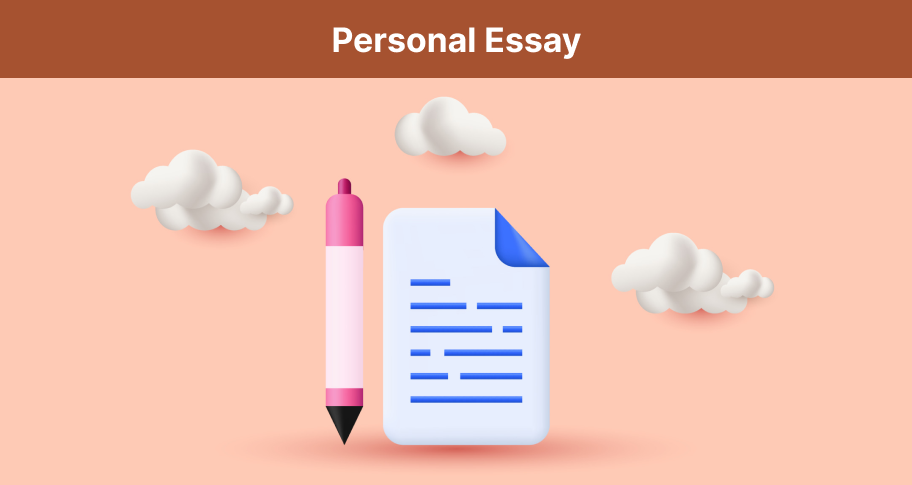
Introduction
A personal essay is a short piece of writing that reflects the author’s personal experiences, thoughts, feelings, memories or sensations—usually with a unifying or deeper theme or purpose. It is like personal narrative in which the writer is given the freedom to explore his own inner world while also connecting with readers on a meaningful level. Personal essays are most frequently used for college applications, where applicants share their life stories to illustrate a finer point. They are often seen in creative writing courses, where writers allow their voice to shine.
Understanding the personal essay genre is beneficial because of how it can improve self-expression and develop one’s ability to communicate. Mastering the art of personal essay writing can empower you to articulate your stories and experiences, your thoughts and feelings, in a way that will resonate with others. Ever heard of Dale Carnegie or How to Win Friends and Influence People ? Well, therein is a perfect example of how far one can get when mastering the personal essay. All in all, personal essay writing is a great way for self-discovery and self-development.
What is a Personal Essay? (Definition & Purpose)
The definition of a personal essay.
A personal essay is a short, non-fiction narrative essay that is entirely written from the writer’s point of view. That means it’s okay to use the “I” or first-person perspective. It is the one type of essay writing in which the author can simply use his own thoughts and experiences as reference point.
Unlike academic or technical essays, personal essays are very flexible in terms of structure and tone. They may take a storytelling approach—or they may be even more creative by adopting a poetic tone and dreamlike structure. There is really no right or wrong way to do it. The defining characteristic of a personal essay is simply its intimate, conversational voice, which lets the reader glimpse into the writer’s mind and personal life. It is like a sit-down with the author.
Thus, at its core, a personal essay is a platform for self-expression. The writer gets to reflect on and explore memories, challenges, defining moments, or comment on anything by looking at it from his own personal POV. Usually, the writer can give insights or lessons learned along the way—and good essayists like Stephen King do this well . That is why personal essays have the power to transcend mere storytelling; they can be a way to experience personal growth indirectly or vicariously. The essay can be a humorous anecdote or a heartfelt reflection, or a strong and visceral condemnation. It can be anything—so long as it is an authentic representation of the writer’s own mind and heart.
Why Personal Essays Matter
Personal essays are used in a range of situations. You will write them for college applications. You will find them on blogs. People publish their memoirs, which are basically like long personal essays. They are common in creative writing workshops. They are great because they get the writing and critical thinking juices flowing.
In college applications, for example, applicants are often asked to write short personal essays that demonstrate some aspect of their personalities, voice, values, perspective, or experiences. A good personal essay could even end up being the difference between acceptance and rejection.
On blogs, personal essays are ways for authors to share relatable stories and anecdotes that connect to other readers’ lives somehow—and, thus, bloggers win followers and fans.
In creative writing, personal essays are valued for their ability to blend narrative with introspection. It is a form that encourages experimentation with voice and form.
Memoirs often consist of interconnected personal essays, stitched together to form a kind of patchwork quilt of personal reflections.
Overall, the emotional impact of a personal essay lies in its authenticity. The more authentic it is, the more cathartic it can be.
When authors make themselves vulnerable by sharing honest thoughts and perspectives, they invite readers into their soul to see the world through the writer’s eyes. It is unlike any other type of connectivity—nothing matches it: not drama, not technical writing, not even familiar correspondence. This connection created by the personal essay (because it is structured and refined) can spark empathy, understanding, inspiration and change.
View 120,000+ High Quality Essay Examples
Learn-by-example to improve your academic writing
How to Structure a Personal Essay
Typical personal essay format.
The structure of a personal essay is open and flexible. That means it can be set up almost any which way. However, a traditional approach offers the most compelling structure, as it consists of an introduction, body, and conclusion. The essay introduction sets the tone and presents the main theme, the body develops the narrative with ample reflections, and the conclusion wraps up the essay with a final reflection or takeaway. It’s a good, solid approach.
Crafting an Engaging Introduction
The introduction of a personal essay should capture the reader’s attention. Use a strong hook (a good intriguing anecdote usually does the trick) to draw readers in. Effective personal essay introduction tips include keeping it concise, setting the tone, conveying your voice accurately, and presenting the main theme or purpose of the essay. This way, the reader gets a sense of what to expect and is more inclined to read on. The perfect phrasing of the first sentence or two can be a great personal essay opening.
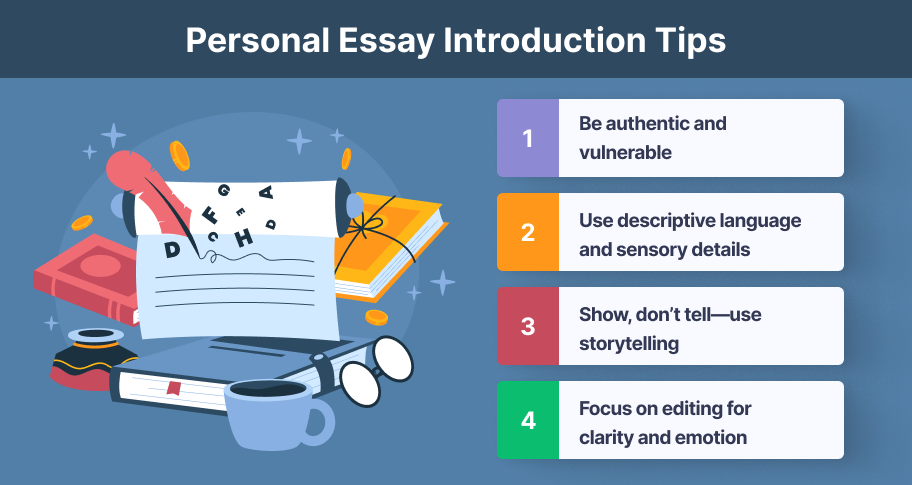
Developing the Body of the Essay
The body of a personal essay is where the writer gets into the personal experiences and considerations that he wishes to share. The body should be organized logically, but the writer is free to use anecdotes and vivid reflections as he sees fit to create an engaging narrative.
The pacing of the essay is important: it should be balanced between reflection and storytelling. You want the essay to emotionally resonate while also speaking to the mind with insight and learning. Each section should focus on an aspect or moment of the story until, gradually, the essay’s deeper meaning is revealed.
If you can foreshadow the full meaning or point in your introduction, even better.
Writing a Strong Conclusion
A well-crafted conclusion leaves a lasting impression. You can summarize the main points, but it’s also a good place to reflect more broadly on the deeper meaning of what you’ve written about. So, instead of restating what has already been said, go for a conclusion that goes deeper still, to reveal an impressive final thought that ties everything together. Personal essays often end on a note of ultimate reflection.
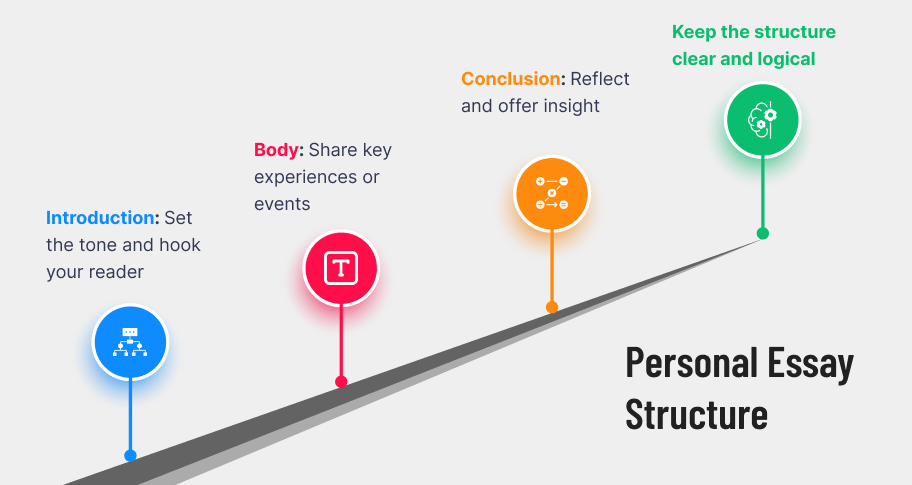
Personal Essay Writing Tips
Be authentic and vulnerable.
One of the most important aspects of a personal essay is its authenticity. Readers connect with genuine, honest experiences, which is why you have to be truthful in your writing. Sharing personal thoughts, emotions, real experiences, worries, concerns, and even insecurities—all of it makes it easier for the reader to relate to you. Writing with vulnerability means being open about your feelings and reflections, even if they make you uncomfortable.
Here’s a tip: balance vulnerability with intention, so that the shared details serve the essay’s ultimate purpose. To be more authentic, avoid trying to impress the reader; instead, focus on simply being sincere and true. No need to apologize—just convey.
Use Descriptive Language and Sensory Details
To create a vivid and engaging personal essay, use descriptive language and sensory details that bring your experiences to life. Show, don’t just tell—describe how things looked, smelled, felt, and sounded. This is how your reader gets absorbed into the writing.
For example, instead of saying “I was nervous,” actually describe the sensation of nervousness: “My hands trembled, my flesh tingled, a cold sweat broke out all over me, and my heart flopped twice in my chest.”
But remember: try to strike a balance between detail and clarity. Overloading your essay with excessive descriptions can bog it down. Too little detail can leave the reader disengaged. Focus on using precise, exciting imagery to improve the narrative when it is most needed.
Editing and Revising Your Personal Essay
Editing and revising are always going to be helpful when it comes to improving your personal essay. After writing the first draft, step away for a bit and come back later with fresh eyes. Read it again and note any areas that could use clarification or expansion. Next, check for common mistakes like awkward phrasing or over repetition.
Be careful, too, not to lose your unique personal voice during the editing process. Avoid the temptation to over-edit, as this can make the essay sound forced or mechanical. When in doubt, have someone else read your essay to offer feedback.
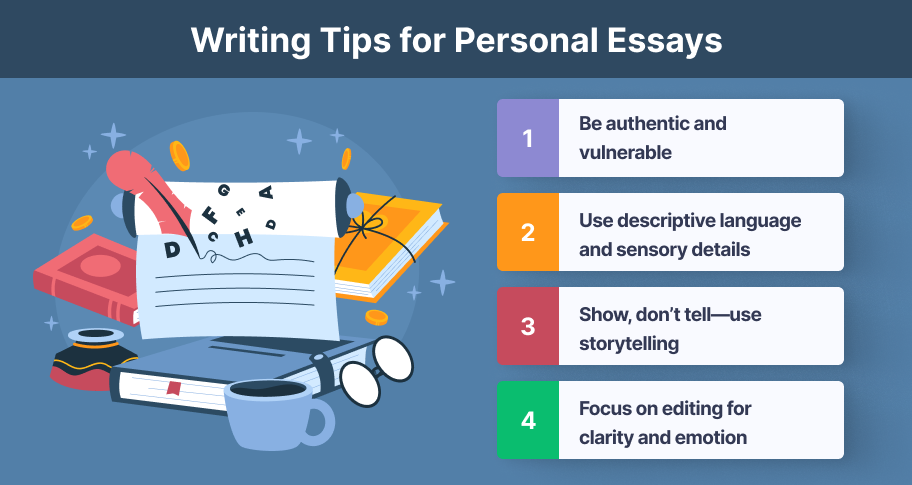
Personal Essay Topics & Essay Prompts
Finding inspiration for your personal essay.
When writing a personal essay, finding the right topic will help you to more easily create a compelling narrative. Common themes often revolve around pivotal life-changing moments that shaped who you are. It will be different for everyone—but just think about who you are and why—what made you that way?
You can look at life-changing moments, relationships, personal growth, achieving personal milestones, difficult decisions you made. Think about family, friends, mentors—how they’ve influenced your development. Think about how experiences have helped strengthen you, or moments of self-discovery that led to deeper understanding of your identity and beliefs.
Personal Essay Topics
High school topics.
- A Challenge I Overcame Reflect on a difficult situation in your life and how you grew from it.
- My Most Memorable High School Experience Write about a specific event during high school that had a significant impact on you.
- How a Teacher Changed My Perspective Discuss how a teacher or mentor influenced your views on education or life.
- The Impact of Extracurricular Activities Share how involvement in a sport, club, or activity has shaped your high school experience.
- A Time I Failed and What I Learned Write about a failure that taught you an important lesson about perseverance.
- How My Friends Have Shaped Who I Am Explore how your friendships during high school have influenced your character.
- The Importance of Balancing Academics and Personal Life Discuss the challenges of managing schoolwork with social and personal activities.
- A Time I Stood Up for What I Believe In Share a story about standing up for your values or beliefs in a difficult situation.
- My Biggest High School Regret Reflect on something you wish you had done differently during high school.
- How I Prepare for Life After High School Write about how you are preparing for the transition from high school to college or the workforce.
College Topics
- The First Time I Felt Independent Describe the moment you first experienced real independence, such as moving to college or making an important life decision.
- A College Course That Changed My Life Write about a class that expanded your worldview or shaped your future goals.
- Balancing School and Life Reflect on how you’ve managed the responsibilities of academics and personal life in college.
- A Time I Took a Risk and Succeeded Share a story about a time you took a big risk and what the outcome taught you.
- How My College Major Has Shaped My Identity Explore how your chosen field of study has influenced who you are becoming.
- The Best Advice I Ever Received in College Write about a piece of advice that helped you navigate college life.
- How My Hometown Shaped Who I Am Today Reflect on how your upbringing or hometown influenced your college experience.
- A College Internship That Changed My Perspective Describe how a work experience or internship impacted your career goals.
- Dealing with Homesickness in College Share your experience of missing home and how you overcame it.
- How College Friendships Have Helped Me Grow Write about how friendships in college have helped you grow personally or academically.
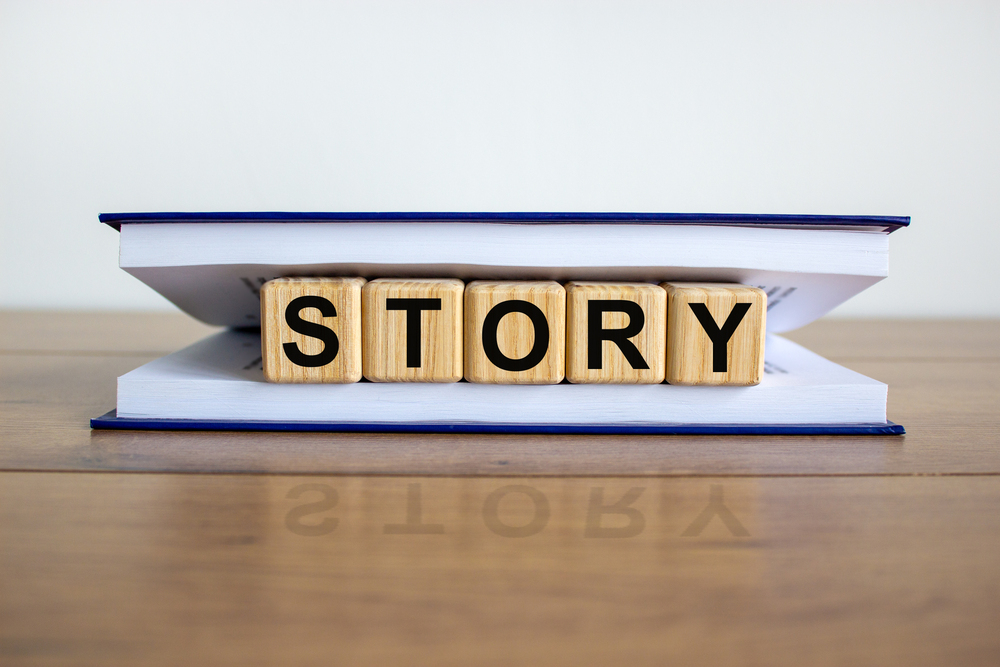
Middle School Topics
- My First Best Friend Share a story about your first close friendship and what it taught you about relationships.
- A Time I Helped Someone Describe a moment when you lent a helping hand to someone, and how it made you feel.
- The Most Exciting Day of My Life Write about a day that stands out in your memory as one of the happiest or most thrilling experiences.
- My Favorite Hobby and Why I Love It Write about a hobby or activity you enjoy and why it’s important to you.
- What I Want to Be When I Grow Up Describe your dream job or future career and why it appeals to you.
- A Family Tradition That Means a Lot to Me Write about a special family tradition and why it’s important to you.
- How I Felt on My First Day of Middle School Reflect on the emotions and experiences of your first day in middle school.
- A Time I Made a New Friend Share a story about how you made a new friend and what it taught you about building relationships.
- My Favorite School Subject Write about the subject you enjoy the most in school and why.
- How I Overcame My Biggest Fear Describe a time when you faced a fear and how it helped you grow.
Unique Topics
- A Mistake That Turned Into a Valuable Lesson Share a story where you made a mistake, and how it led to unexpected growth or insight.
- A Conversation That Changed My Perspective Write about a meaningful conversation that caused you to think differently about an important topic.
- The Time I Experienced a Culture Shock Describe a moment when you were exposed to a different culture or way of life and how it impacted you.
- A Time I Broke the Rules Share a story about when you broke a rule and what the consequences taught you.
- My Favorite Place in the World Write about a place that holds special meaning for you and why it’s significant.
- How a Book or Movie Changed My Life Discuss how a specific book or film impacted your way of thinking or inspired you.
- A Time I Got Lost Share a story about getting physically or emotionally lost and what you learned from finding your way.
- If I Could Live in Another Time Period Write about which historical time period you would want to live in and why.
- A Skill I Taught Myself Describe a time when you learned something on your own and how it shaped your confidence or abilities.
- The Most Unexpected Lesson I Learned from a Stranger Share a story about learning something valuable from someone you didn’t know well.
Sample Prompts for Personal Essays
If you’re struggling to come up with an idea, here are some personal essay topic ideas and essay prompts for personal writing to get you started:
- Write about a moment when you had to make a difficult decision. What was at stake, and how did it change you?
- Describe a time when you experienced failure. How did you respond, and what did you learn from the experience?
- Reflect on a relationship that has deeply impacted your life. What did it teach you about life, yourself, or others?
- Share a story about a time when you stepped outside of your comfort zone. What fears did you overcome, and what did you gain?
- Write about a personal achievement that made you feel proud. What steps did you take to get there, and why does it matter to you?
- Discuss a moment of self-discovery that changed the way you view the world or yourself.
- Describe a significant challenge or hardship you’ve faced and how it shaped your character.
- Reflect on a cultural or family tradition that holds personal meaning for you.
- Write about a time when you had to stand up for something you believed in. What motivated you, and what was the outcome?
- Share a memory that brings you joy and explain why it’s important to you.
- Write about a moment when you learned a hard truth about yourself or someone else.
- Reflect on a time when you felt out of place or misunderstood. How did you cope, and what did it teach you?
- Share a story about a person or event that inspired you to pursue a particular path or goal.
- Discuss how a personal hobby or interest has shaped your identity.
- Write about a time when you faced a moral dilemma. How did you resolve it, and what did you learn?
Examples of Well-Written Personal Essays
Analysis of famous personal essays.
One of the most well-known personal essays is Joan Didion’s “Goodbye to All That,” where she reflects on her time in New York City. Didion’s essay is effective because of its emotional depth and objective storytelling. She blends personal reflection with sharp, sensory details. The reader lives through her experience. Didion’s honesty and vulnerability in discussing her fading love for the city help create the sensation of disenchantment—and the reader feels it completely.
Another excellent example is “The Death of a Moth” by Virginia Woolf. In this essay, Woolf transforms a seemingly mundane event—the death of a moth—into a profound reflection on life and mortality. Woolf’s ability to take a small, ordinary moment and imbue it with universal meaning is what makes her essay stand out. The essay is less about her own life and more about life in general, but it is all her in the sense of perspective. Her prose and insights, and use of symbolism, gives the reader some big themes to chew on.
Key Takeaways from Successful Personal Essays
To make a personal essay impactful, here are a few techniques to follow:
- Authenticity : Share personal stories and emotions honestly and openly.
- Vivid descriptions : Use sensory details to make the narrative come alive for the reader.
- Emotional depth : Convey your inner thoughts and feelings to create a connection with the audience.
- Universal themes : Relate personal experiences to broader, more relatable human experiences.
- Reflection : Go beyond storytelling by offering insights or lessons learned.
- Symbolism and imagery : Elevate ordinary moments into meaningful reflections by using literary devices.
How to Get Feedback on Your Personal Essay
The importance of peer review.
Receiving feedback can help with refining your personal essay. Peer review can give you new perspectives on your writing, help identify unclear sections, and allow you to see what you didn’t see before. Constructive criticism from others can give you an idea of what your audience might be thinking. When seeking feedback, be open-minded and accept critiques as opportunities for growth. Not every suggestion needs to be followed—after all, it’s your essay. But focus on the suggestions that improve clarity, emotional impact, and narrative flow, and don’t be afraid to make revisions.
Online Tools & Writing Communities
There are numerous online platforms where you can share your work and receive valuable feedback. Writing forums like Reddit’s r/writing or Scribophile are spaces where writers can exchange critiques. Social media groups dedicated to writing are also great places to get input from fellow writers. So are structured writing workshops, like those offered by Writer’s Digest or The Write Life. These platforms help you to connect with a community of writers. With them you’ll have a chance to get personalized peer review for essays and online writing feedback.
Common Mistakes to Avoid in Personal Essays
Overloading with unnecessary details.
One common mistake in personal essays is including too many irrelevant or trivial details that detract from the core message. Descriptions are important, but don’t overload the essay with unnecessary information. Describe what needs to be described to communicate the themes. Don’t overwhelm the reader and dilute the emotional impact by focusing on insignificant details. Give, instead, details that add to the story and contribute to the overall idea. Every sentence should serve a purpose—if it doesn’t add value or further the narrative, it’s best to leave it out.
Lack of Focus or Clear Theme
Another mistake is writing without a clear theme or losing focus as the essay progresses. A personal essay should revolve around a specific idea, experience, reflection, or lesson. When the essay lacks focus, it just ends up feeling disjointed and confused. To avoid this, establish a central theme early in the essay and stick to it; make sure every detail somehow relates back to it so as to deepen its meaning or enlarge it somehow. Every story, anecdote, reflection, and detail should tie back to that theme. A strong narrative thread will make the essay more engaging and meaningful.
Over-Editing or Losing Personal Voice
Be careful to avoid over-editing, which can result in an essay that feels too polished and impersonal. In an effort to perfect grammar or structure, writers sometimes lose their own unique voice and emotional authenticity. Avoid editing to the point where the essay becomes mechanical—try to keep the raw, honest tone that makes personal essays compelling. Trust your voice and trust your gut and let it shine through.
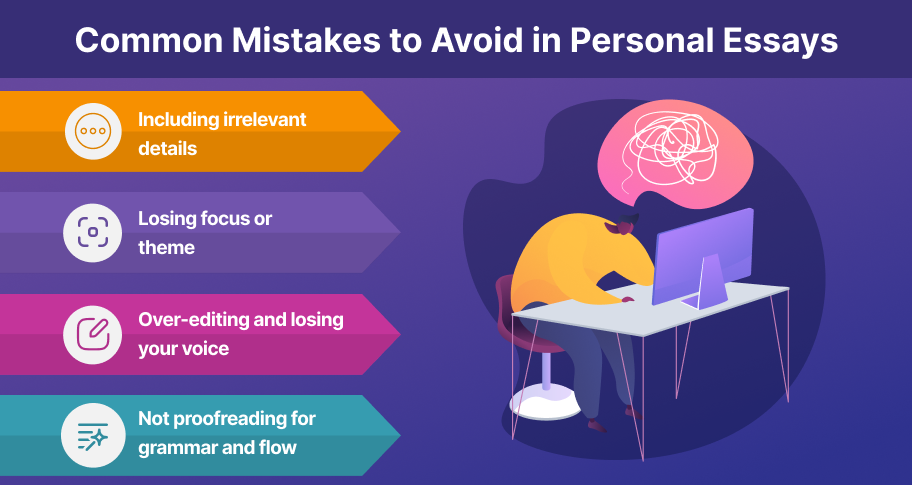
Final Checklist Before Submitting Your Personal Essay
Editing and proofreading tips.
Before submitting your personal essay, run through this quick checklist:
- Grammar and spelling : Correct any grammatical errors and typos to ensure professionalism.
- Flow and structure : Ensure that your essay follows a clear, logical progression, with smooth transitions between paragraphs.
- Clarity : Make sure your main points are easily understood and that your theme remains focused throughout.
- Emotional impact : Review whether the essay evokes the intended emotions and resonates with readers.
- Personal voice : Ensure that your unique voice and perspective shine through without sounding overly polished or formal.
Confidence in Sharing Your Story
As you prepare to submit your essay, remember that your story is uniquely yours. Embrace your experiences and insights with pride. Your personal essay is a reflection of you. Don’t apologize for it. Confidence in your writing comes from understanding that no one else can tell your story the way you can. Trust your voice and be proud of your work!
Writing a personal essay is a powerful way to express your experiences, thoughts, insights, lessons learned, feelings, and memories. You can structure it however you want—but be consistent. The traditional way is to start with an engaging introduction, followed up by a well-organized body, and finished off with a reflective conclusion. Use that approach and you have the backbone for a compelling narrative.
Remember to maintain authenticity by writing with honesty. Let yourself be vulnerable—it’s okay and expected in a personal essay. Use descriptive language to bring your story to life—but don’t overdo it. Take time to revise carefully. Polish your essay, but don’t kill it with too much care. Let your personal voice live and shine in your words and ideas. This is, after all, a reflection of you and who you are and what you’ve seen and where you’ve been!
Need additional help? Download our personal essay writing worksheet to help get you started!
Take the first step to becoming a better academic writer.
Writing tools.
- How to write a research proposal 2021 guide
- Guide to citing in MLA
- Guide to citing in APA format
- Chicago style citation guide
- Harvard referencing and citing guide
- How to complete an informative essay outline
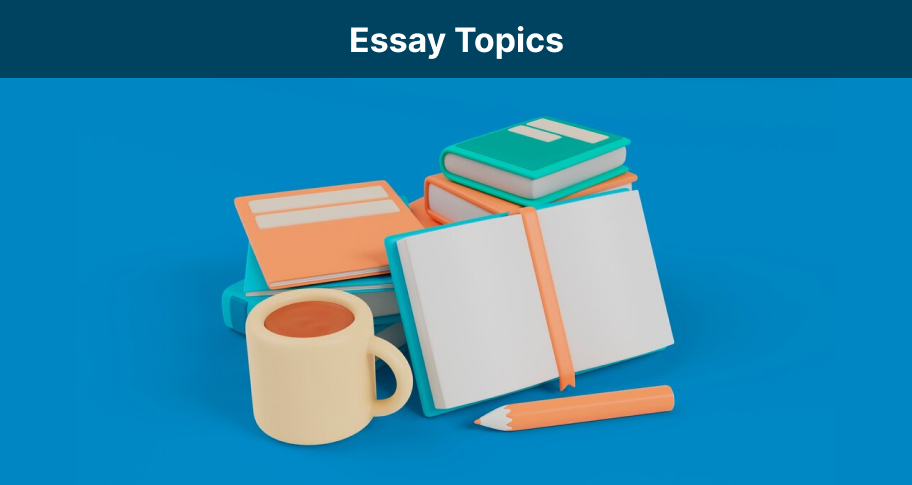

How to Choose the Best Essay Topics

AI Text Detection Services
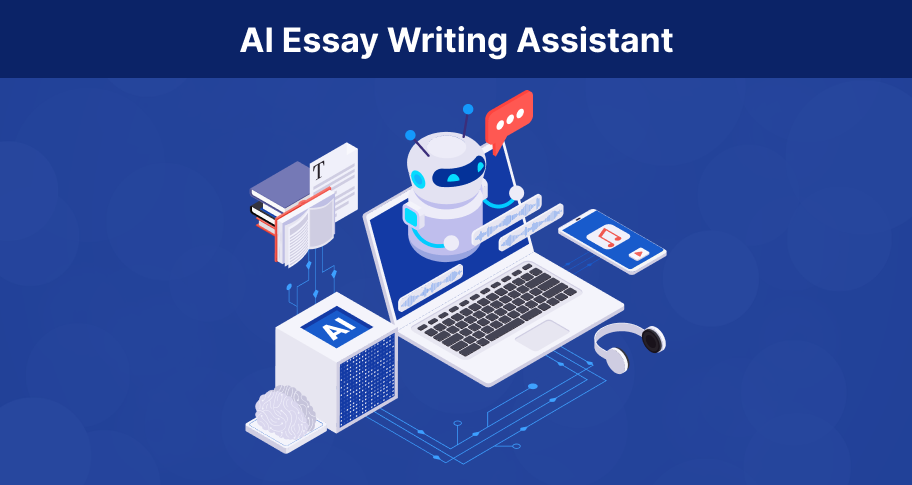
Unlock Your Writing Potential with Our AI Essay Writing Assistant

The Negative Impacts of Artificial Intelligence on Tactile Learning

Ultimate Guide to Writing a Personal Essay
A personal essay is a type of creative nonfiction in which the writer tells the reader about their own thoughts, experiences, and feelings. In contrast to other types of essays that focus on research, analysis, or making an argument, a personal essay is more about thinking about yourself and what you want to say.
The point of a personal essay is to show who the writer is, what they’ve been through, and how they see the world. By sharing personal stories and thoughts, the writer can connect with the reader on a deeper level and give a unique and personal view on a certain topic or issue.
There are many reasons why personal essays are important. They let writers explore their own thoughts and feelings and share what they’ve learned with other people . Personal essays can also be a great way to help people understand and care about each other by giving them a window into the lives of others.
In this article , we’ll show you how to write a personal essay from start to finish, with 10 examples and ideas to get you started. We will talk about the basic structure of a personal essay and give you tips on how to tell a good story and connect with your audience.
Whether you’re a student who wants to improve your writing skills or a professional who wants to share your personal experiences and insights with others, this guide will give you the tools you need to write a compelling personal essay.
What You'll Learn
Elements of a Personal Essay
To write a compelling personal essay, it is important to include the following elements:
1. The importance of a clear theme: A clear theme provides focus and coherence to your personal essay. It should be a central idea that ties together all of the events and experiences you describe in your essay .
2. Creating a compelling introduction: Your introduction should grab the reader’s attention and provide a hook to draw them in. It should also introduce your theme and provide some context for the events and experiences you will describe in your essay .
3. Developing a narrative arc: A narrative arc is the structure that guides your personal essay. It should include a beginning, middle, and end, with a clear progression of events that build toward a climax and resolution.
4. Creating dynamic characters: Your personal essay should include characters that are well-developed and engaging. This can include yourself, as well as other people who have played a significant role in your experiences .
5. Dialogue and description: Dialogue and description are important tools for bringing your personal essay to life. They can help to create a sense of immediacy and intimacy, and can help to convey the emotions and experiences you are describing.
6. Reflection and analysis: Your personal essay should include reflection and analysis on the events and experiences you describe. This can help to provide insight into your thought processes and personal growth.
7. Conclusion and takeaway: Your personal essay should include a conclusion that provides closure and a sense of resolution.It should also leave the reader with a takeaway or lesson that they can apply to their own lives .
Choosing a Topic
Choosing a topic for your personal essay can be challenging, but it’s important to select a topic that is meaningful and relevant to your life experiences. Here are six categories of topics to consider:
1. Personal experiences: Write about a significant event or experience in your life, such as a difficult decision you had to make, a moment of triumph or failure, or a life-changing experience.
2. Relationships and family : Explore the dynamics of your relationships with family members, friends, or romantic partners. Write about the challenges, joys, and lessons you have learned from these relationships.
3. Identity and self-discovery: Reflect on your personal identity and the experiences that have shaped your sense of self . Consider how your background, culture, or beliefs have influenced your worldview.
4. Travel and culture: Write about your experiences traveling to different parts of the world, and how these experiences have broadened your perspective and challenged your assumptions.
5. Challenges and obstacles: Write about a difficult challenge or obstacle you have faced , and how you overcame it. Consider the lessons you learned and how this experience has shaped you.
6. Hobbies and interests: Write about a hobby or interest that is important to you, and how it has influenced your life and worldview.
You can write an interesting and powerful personal essay if you choose a topic that is important to you and relates to your life. When writing your piece, keep in mind the parts of a personal essay and take the time to think about your experiences, feelings, and personal growth. With these tools, you can write a personal essay that will connect with readers and show them your unique thoughts and experiences.
Personal Essay Examples
Reading personal essay examples can be a helpful way to understand the elements of a strong personal essay. Here are 10 inspiring personal essay examples:
1. “The Fourth State of Matter” by Jo Ann Beard
2. “On Keeping a Notebook” by Joan Didion
3. “Me Talk Pretty One Day” by David Sedaris
4. “The Year of Magical Thinking” by Joan Didion
5. “Notes of a Native Son” by James Baldwin
6. The Death of My Father” by Steve Martin
7. “The White Album” by Joan Didion
8. “Consider the Lobster” by David Foster Wallace
9. “The Empathy Exams” by Leslie Jamison
10. The Glass Essay” by Anne Carson
Each of these personal essays is characterized by its unique voice, vivid storytelling, and thoughtful reflection. Reading these examples can help you develop an understanding of the different ways that personal essays can be structured and the types of topics that can be explored.
Personal Essay Topics
Choosing a topic for your personal essay can be challenging, but there are many different areas of your life that you can explore. Here are 15 personal essay topics to consider:
1. A meaningful experience that changed your life
2. A challenge you overcame
3. A relationship that impacted your life
4. Your cultural identity
5. A place that is special to you
6.A hobby or interest that defines you
7. A pivotal moment in your life
8. A difficult decision you had to make
9. An obstacle you faced and how you overcame it
10. Your personal beliefs and values
11. The importance of family in your life
12. Your greatest achievement
13. A time you failed and what you learned from it
14. A lesson you learned from someone you admire
15. A childhood memory that has stayed with you
These personal essay topics can be adapted and expanded to fit your own experiences and interests. Remember to choose a topic that is meaningful to you and that you can explore in depth through storytelling and reflection. With the right topic and approach, you can write a personal essay that is both engaging and impactful.
Personal Essay Structure
A clear structure is essential to a well-written personal essay. Without a clear structure, your essay may feel disjointed and lack coherence. Here are some tips for structuring your personal essay effectively:
1. Start with an engaging introduction that captures the reader’s attention and sets the tone for the rest of the essay .
2. Develop a clear narrative arc that guides the reader through the events and experiences you describe. This should include a beginning, middle, and end, with a clear progression of events that build toward a climax and resolution.
3. Use descriptive language and sensory details to bring your experiences and characters to life. This can help to create a sense of immediacy and intimacy, and can help to convey the emotions and experiences you are describing.
4. Include reflection and analysis on the events and experiences you describe. This can help to provide insight into your thought processes and personal growth.
5. End with a conclusion that provides closure and a sense of resolution. It should also leave the reader with a takeaway or lesson that they can apply to their own lives.
Frequently Asked Questions
1. what is the difference between a personal essay and a memoir.
A personal essay is a short, non-fiction piece that focuses on a single event or experience. A memoir, on the other hand, is a longer work that typically covers a larger period of time and may include multiple events and experiences .
2. Can I use humor in a personal essay?
Yes,humor can be a powerful tool in a personal essay. However, it’s important to use humor in a way that is appropriate to the tone and content of your essay .
3. Should I use first person in a personal essay?
Yes, it is generally appropriate to use first person in a personal essay. This allows you to speak from your own perspective and to share your personal experiences and insights with the reader.
4. How do I make my personal essay stand out?
To make your personal essay stand out, focus on developing a unique voice and perspective. Be honest, authentic, and vulnerable in your writing, and try to convey your experiences and emotions in a way that is both relatable and insightful.
5. How long should a personal essay be?
The length of a personal essay can vary depending on the assignment requirements. However, a typical personal essay is usually around 500-800 words.
In conclusion , personal essays are an important type of creative nonfiction that let writers share their own experiences and insights with others. You can write a powerful and memorable personal essay by making sure it has a clear structure, an interesting story, and thoughtful reflection.
Remember to choose a topic that is important to you and to use descriptive language and sensory details to bring your experiences to life. With the right approach and frame of mind, you can write a personal essay that makes readers feel something and gives them a unique and personal view of the world.
Start by filling this short order form order.studyinghq.com
And then follow the progressive flow.
Having an issue, chat with us here
Cathy, CS.
New Concept ? Let a subject expert write your paper for You
Post navigation
Previous post.
📕 Studying HQ
Typically replies within minutes
Hey! 👋 Need help with an assignment?
🟢 Online | Privacy policy
WhatsApp us
Vandy Bloggers

How To: Write Your Personal Essay
Posted by Carolyn Pippen on Wednesday, September 11, 2013 in Application Process , General Information , The College Essay .
While we still have a few more days until the official beginning of fall, around here it feels a lot like the season has already begun. Classes are back in session , the leaves are falling off the trees, and most of our counselors have departed for the two-month marathon of flights, high school visits, and college fairs that we call travel season.

In addition, thousands of high school seniors across the country have begun the process of filling out college applications. Regardless of whether or not one of your applications will be submitted to Vanderbilt, we would like to offer you a few nuggets of the expertise we have acquired working with students and evaluating applications over years.
Thus we give you: The “How To” Series. Over the next several weeks, we will be posting lists of tips concerning various pieces of the application that we hope will make this process a little less overwhelming for all of you. Today’s tips focus on the personal essay.
- Be thoughtful, but not fretful. As a senior, most of the accomplishments that will make up the bulk of your application – academic performance, test scores, and extracurricular involvement – are said and done. In a sense, the only part of the application over which you have complete control right now is the essay. Don’t let this scare you! While the essay is a valuable tool that we use to understand you better, it is rarely if ever a “make or break” component of your application.
- Keep the “personal” in personal essay. The Common Application presents six different prompts for you to choose from when writing your essay. To be honest, we don’t really care that much what you write about, as long as you’re writing about you. In other words, don’t spend the entire essay detailing the life of your favorite and most accomplished family member, but rather focus on how that person has affected you and your life decisions. Don’t give us a detailed narrative of your favorite community service trip, but instead tell us what you learned from that trip and how it has changed your outlook on the world. This is one time when it’s okay to be self-centered – more than anything, we want to know about you!
- Don’t try to guess what the reader wants to hear. If you ask a hundred different admissions counselors what their favorite kind of essay is, you will likely get a hundred different answers. Trying to figure out what topic will get us most excited is like trying to guess which outfits the judges of Project Runway are going to like the most – no matter how many times we watch, Heidi always manages to confound. Instead of trying to game the system, focus on the things that get you excited. If nothing else, I promise that passion will show through.
- Feel free to be funny or creative – but don’t overreach. If your friends tell you that you’re the funniest person in the class, use that skill to your advantage. If your creativity is what sets you apart from your peers, let that innovation guide the structure and content of the essay. On the other hand, if every joke you make at the cafeteria table falls flatter than a pancake in a Panini press, don’t try to fake it. Figure out what your personal strengths are, and stick with them.
- Tell us something we don’t already know. When writing your essay, be sure to keep in mind all of the other pieces of your application we already have in front of us while we’re reading it. Do not use this space to summarize your extracurricular involvement or your academic achievements if we’ve already seen these things in your resume and transcript. We know that there is more to you than just test scores and leadership roles, so tell us more!
- Ask for input (but not too much). Your parents, friends, guidance counselors, coaches, and teachers are great people to bounce ideas off of for your essay. They know how unique and spectacular you are, and they can help you decide how to articulate it. Keep in mind, however, that a 45-year-old lawyer writes quite differently from an 18-year-old student, so if your dad ends up writing the bulk of your essay, we’re probably going to notice.
- Edit, proof, polish, and breathe. Beyond gaining insight into your personal psyche, the purpose of the essay is also to showcase your written communication skills. Treat this essay just like any class assignment – write it early, proof and revise, keep an eagle eye out for spelling and grammatical errors, and make sure it is presented in a clean and polished way. That being said, do not call our office in a panic if you discovered a missing article or a misused “its” after you hit submit. Because of our holistic selection process , no student will be denied based on one element of his or her application; this includes typos.
Tags: academic credentials , breathe , college applications , Common Application , essay writing , extracurricular activities , Heidi Klum , how to apply , personal essay , Project Runway
November 11th, 2013
Hi Carolyn, students get stressed regarding writing college admission essays. Your tips are going to help them a lot.
November 30th, 2013
thanks it helped me write a good essay
July 22nd, 2015
Thanks for the informative tips on short essay writing .
January 20th, 2016
Hello, I am applying to a liberal arts college and am sort of stuck up on the essay. Should I be completely honest and mention my shortcomings. I am pretty much introverted and not a good conversationalist. Should I or should I not mention these
January 27th, 2016
Your essay should help to give better, deeper insight into you as a person. As the post mentions, your essay should supplement the other parts of your application to help us understand you better. That said, you don’t have to include anything about yourself that you don’t feel comfortable sharing.
April 25th, 2016
Great tips!
September 3rd, 2016
Is there a specific place to write the essay and is there a prompt, the common app doesn’t have a location to attach a personal essay.
September 6th, 2016
Thank you for your question. The Common Application gives students the option to choose one of five essay prompts. You can read the essay promts on the Common Application site at http://www.commonapp.org/whats-appening/application-updates/common-application-announces-2016-2017-essay-prompts
Again, thanks for your question and your interest in Vanderbilt.
September 17th, 2016
so Vanderbilt does not have additional or supplemental essays?
September 20th, 2016
Thank you for your question – you are correct, there are no supplements for Vanderbilt.
September 21st, 2016
Hi! I’m just adding the final touches to my application and I’m ready to send it off. I’m very excited! Just a clarification: when you say there aren’t any supplements for Vanderbilt, does it mean that the activity essay/expansion isn’t required or is that not classified as a supplement? Thank you!
September 22nd, 2016
Hi Hannah, thanks for your question (and congratulations on finishing up your application). This can vary depending on the specific application method you are using. I think you may be asking about the Common App, and in that case the short answer about activities is required to submit your application. We don’t consider that a supplement because it is a part of the Common Application. If you have more questions, please feel free to follow up.
Thank you for the clarification!
September 23rd, 2016
I made a mistake..3 actually! I submitted my application today and after looking back through my pieces of writing, I realized that I accidentally wrote a word twice in my personal statement and forgot a period, and I also failed to include a small word in my topic sentence for my activities essay on the common app. Apparently, I was far too excited to hit submit. I would hate to have my admission chances suffer because of this. I’ve emailed my admissions counselor, but in the meantime, is there anything that can be done? Thank you!
September 30th, 2016
Hi Hannah, thank you for checking in on this. Emailing your admissions counselor is absolutely the right course of action, and I am sure they will handle it from here. Don’t worry about it! And thanks for your enthusiasm about Vanderbilt!
April 13th, 2017
Thanks for tips, right now i’m in the middle of essay writing, so your article is just what i needed. Start to get more and more worried each day, seems like now i know what to do
Your Vanderbilt
- Current Students
- Faculty & Staff
- International Students
- Parents & Family
- Prospective Students
- Researchers
- Sports Fans
- Visitors & Neighbors
Quick Links
- PeopleFinder
How To Write A Personal Essay: In 6 Easy Steps
When you’re learning how to write a personal essay, it’s normal to feel overwhelmed. Here, we’ll break down everything you need to know about essay writing.
If you’re worried about writing a personal essay, you’re not alone. Many people have a hard time writing in essay format, especially regarding a topic that elicits an emotional response. A good personal essay may share a deeper truth, describe a profound life experience, tell a striking personal story, or describe relationships with family members in a relatable way.
Whether you’re a seasoned essayist or in high school and writing an essay thesis statement for the first time, following a few simple steps can help you grab your reader’s attention. With practice, you can hammer home your main points, and share a personal experience in an enjoyable way for readers. Learn more about what is a personal essay
1. Choose Your Essay Topic
2. create a personal essay outline, 3. write your first draft , 4. revie and revise your essay draft, 5. format your essay , 6. seek feedback , the final word on how to write a personal essay, what topics are acceptable for a personal essay, how long should a personal essay outline be.

A personal essay is a type of creative nonfiction writing that shares a personal, profound life experience. Often told in first-person style, a personal essay relays a sequence of events with deep meaning.
Before beginning your personal essay, you’ll need to brainstorm a list of personal essay topics. Think about parts of your life that had a large impact on your current view of the world. Events that seemed small at the moment may have largely informed your life view. As your brainstorm, try not to judge yourself — freely jotting down all of your ideas will help you begin to craft your real-life piece of writing.
Narrow down your subject matter options and choose a topic from your list. Hang onto your list for another time — you may want to return to it later in life when it’s time to write a college admissions essay (check out these fantastic college admissions essays ).
Your narrative essay outline will guide your writing, making it easier for you to create a well-organized piece of writing that makes sense for your target audience. A good personal essay outline should contain several sections, including an introduction, several body paragraphs, and a conclusion. The introduction must draw the reader into a story. The first sentence should grab your reader’s attention and give them a reason to continue reading, even if they disagree with you.
This example from a Cornell applicant does a great job at making the reader want to learn more:
My face brightened as morning commuters passed by and took flyers from my hand. As they turned the corner, they carelessly tossed the flyers away. My brows furrowed. Is this what I woke up at seven in the morning for? To hand out flyers to indifferent strangers who won’t give the time of day, nevertheless a second glance? I was just a background character, a boy handing out flyers in the scene of a lively street. I was a mannequin, easily passed by unnoticed.
Throughout the rest of the introduction, work to breadcrumb your story (drop hints about exciting points to come). Try to hit on one point in each body paragraph. Longer isn’t necessarily better—try to eliminate fluff from your essay. Your goal is to keep your reader engaged in your story from start to finish. Looking for more how-to-guide articles? You might find our guide on how to write a game review helpful in writing that review on a new app or game online.

After you’ve completed your outline, it’s time to start fleshing out your work with a first draft. Try not to worry too much about writing in active voice versus passive voice, or about perfecting the mechanics of your grammar.
Your first draft is all about getting your thoughts on the paper, and you’ll have plenty of time to proofread and revise later.
As you write your first draft, you may find that you need to adjust your outline—and that’s ok. Writing a college essay or other personal narrative isn’t usually linear. During the initial writing phases, share your experiences or point of view honestly. If you’re struggling, start small. Write the first sentence of each paragraph and fill in your first draft from there. Check out our guide to writing a first draft .
For your conclusion, be sure to tie your story together and hammer home your main point. Take a look at this personal essay conclusion from an essayist exploring her feelings about her cultural heritage:
I can now appreciate the value of my unique culture and background, and of living with less. This perspective offers room for progress, community integration, and a future worth fighting for. My time with Assemblyman Sepulveda’s office taught me that I can be a change agent in enabling this progression. Far from being ashamed of my community, I want to someday return to local politics in the Bronx to continue helping others access the American Dream. I hope to help my community appreciate the opportunity to make progress together. By embracing reality, I learned to live it. Along the way, I discovered one thing: life is good, but we can make it better.
If time permits, take a day or two away from writing before you begin the process of editing and proofreading your first draft. Taking a step back will allow you to gain some distance from your piece of writing, and can allow you to see what you’ve written with fresh eyes.
First, read over your draft and pay attention to how your personal narrative essay flows from one point to the next. Don’t worry about formatting or voice yet—simply make sure your introductory paragraph flows easily into your body paragraphs and that your final body paragraph flows easily into your essay’s conclusion. Is this your first time creating writing prompts? Check out our guide on how to create a writing prompt . Or you can also check out our other how-to articles by typing “how to” in our search bar.
Once you have your story straight, it’s time to ensure that your essay is reader-friendly. Be sure you’re meeting any specified formatting requirements (for example, if you’re writing a college essay, you may need to use certain margins or spacing). You’ll also want to take some time to go over the mechanics of your essay, working to write in active voice over passive voice, as well as working to eliminate any grammatical errors.
In short, read or ask for the style guide for wherever you’re submitting the essay in question. Common style guides include APA, the Chicago Manual of Style and the Havard style guide. Check out our guide to style guide templates .
It’s tough sharing personal writing with someone else, but doing so can help you dramatically improve the quality of an essay. So, ask a trusted friend or family member to take a look at your essay and give you honest feedback on how you can make it even better. Ask them to provide critical feedback and suggest areas for improvement. Alternative, why not find a beta reader ?
The process of writing a personal essay can feel daunting, but breaking it down into steps can make it a little bit easier. Take your time, and remember, if you’re sharing your personal story and deep truths, you’re doing it right. Once you’ve written a personal essay, publish it online, submit it to a competition or a journal. Don’t let it sit in your drawer. If still need help writing an essay, in this interview, Pam Munter explains the art of personal essay writing .
FAQs on How To Write a Personal Essay
For a personal essay, any topic that examines an important life experience or a learned deep truth is an excellent jumping-off point.
An outline can be anything from a few words to a few sentences. If it gives you an idea of where your essay is headed and helps to guide your first draft, you’re on the right track
Personal Essay
Last updated on: Feb 9, 2023
Learn How to Write a Personal Essay by Experts
By: Cordon J.
Reviewed By: Jacklyn H.
Published on: Sep 28, 2021

Teachers typically assign a personal essay, along with other kinds of essays at the beginning of the high school year. Their reason behind this is to evaluate your writing abilities, communication skills and also to get to know you a little better.
If you are overwhelmed with the writing process or don’t know what to include in your essay, there’s no need to panic!
This complete guide will provide you with all the necessary steps for writing a personal essay. We have also mentioned a sample and some additional tips for you to ace your personal essay and create a lasting impression.

On this Page
What is a Personal Essay?
A personal essay is a type of writing that is based on the personal experiences of the writer. It talks about such life experiences that were the turning point for the writer or resulted in some major lessons and growth.
Not just that, you can also write a personal essay to address an issue close to your heart and how you feel about it.
The focus of such essays isn’t having to prove a point. But, it is to share the writer’s feelings, personal opinions, and experiences. It is a work of creative nonfiction autobiography narrated in a way that the reader feels as if he experienced it himself.

Paper Due? Why Suffer? That's our Job!
Characteristics of a Personal Essay
Now that you have understood the personal essay definition let's take a look at the different writing styles and their characteristics.
When writing a personal narrative:
- To write a personal narrative essay, the center point should be a significant and meaningful life-changing experience.
- Since it is a narration, you must include storylike elements such as plot, setting, characters, imagery, dialogues, etc.
- It is written in the first-person perspective.
- It is an insight into the writer’s personal story, so it doesn’t need to be objective.
- The writer must be honest when sharing real-life incidents.
Sharing a Personal Opinion:
- It is kind of like a conversation with the readers where you can talk about an issue and propose a solution.
- It includes facts.
- It isn’t an essay about yourself, but an issue from your perspective.
- Your opinions are like evidence to prove the argument.
How to Write a Personal Essay
Writing a personal essay for college isn’t much different from other types of essays. They all follow the same writing process and structure - the only difference is the content.
Follow the steps given below to learn how to write an interesting personal essay.
1. Come Up with an Interesting Topic
When choosing a topic to share with your reader, think about things that you like reading about yourself. These are normally the things that you can relate to, such as overcoming a hurdle, losing a loved one, a milestone, etc.
It’ll be easier to write about events or experiences that hold a significant meaning in your life. Or, the incidents that happened to others at some point and you witnessed it.
The idea is to write about something that will teach your reader’s a lesson.
2. Create a Personal Essay Outline
It is always better to organize your essay and information using a proper structure to avoid going off track. Make a list of everything that you want to share with your reader and then create an outline to organize this information into different sections.
- Introduction
“How to start a personal essay?”
For a personal essay, make sure that you start on a light note. Build the reader's interest by providing them with something catchy and interesting about yourself. You can do that in the form of an anecdote, short story, or some fact.
To make it easier for the reader to understand, introduce the characters in your story as well as yourself.
- Body Paragraphs
he body typically consists of three paragraphs, but it can vary depending on your teacher's requirements. Chronologically describe the life events and how they influenced your beliefs and personality.
While writing such essays, your focus should be to show and not tell. Provide descriptive details about the incidents to make it easier for the reader to visualize. Use sensory details so that the reader uses his five senses to visualize your story.
Don’t just focus on narrating the story. Don’t forget the main purpose – how the event influenced and changed your life.
The conclusion is just as important as the opening of your essay. Use it to give the reader a sense of closure and reflect on your life events.
Tough Essay Due? Hire Tough Writers!
Personal Essay Examples PDF
POETRY ANALYSIS ESSAY EXAMPLE (PDF)
Personal Essay Topics
Here are some interesting personal essay topics to give you an idea:
- Someone who taught you an important lesson.
- Things you learned from your mistakes.
- In what ways can you contribute towards the betterment of our society?
- The incident that changed your life forever.How you got rid of a bad personality trait.
- How did you meet your partner?
- What is your dream job and why?
- What is your favorite book and why?
- When did you majorly got inspired by someone or something?
- The most admirable work of art you came across
Personal Essay Writing Tips
Keep in mind the following tips to write a high-scoring personal essay:
- Always remain truthful when narrating your story and events from your real life.
- Take out some time to list down your thoughts that you want to incorporate in the essay beforehand.
- Don’t add irrelevant details to meet the word count as it will only bore the reader.
- Don’t feel shy sharing your failures. Instead, use them to show how you became a better version of yourself because of the setbacks.
- Maintain a positive point of view throughout the paper.
- Write in a conversational tone.
- Read the essay after you are done writing. Proofread and revise them as needed.
Check out more about writing a personal statement .
This was everything you needed to craft an interesting personal essay. Remember that there is a greater purpose than simply narrating a story. Your aim should be to inspire the reader with the lessons that you have learned.
If you get stuck during the writing process, all you need to do is reach out to the experts at 5StarEssays.com and they will write essay for you accordingly.
Whether you need help writing an essay from scratch or need editing assistance, we’ve got it all covered. Place your order today and get affordable help!
Frequently Asked Questions
What are the elements of a personal essay.
Following are the major elements of a personal essay:
- Character descriptions
- Dialogue association
- Setting description
- To the point focus
- Strong introduction
- Logical sequence
- Real details
Do personal essays have to be true?
Yes! A personal essay is an engaging way of showing off your growth and change through life's experiences. Unlike formal writing, you don't have to prove anything in a personal narrative because it speaks for itself!
How do you identify a personal essay?
A personal essay is typically written in the first person and has a conversational tone. The writer uses self-disclosure, honesty, and truth to tell their story of any experience they've had that relates back to various aspects of their lives.

Law, Persuasive Essay
Cordon. is a published author and writing specialist. He has worked in the publishing industry for many years, providing writing services and digital content. His own writing career began with a focus on literature and linguistics, which he continues to pursue. Cordon is an engaging and professional individual, always looking to help others achieve their goals.
Was This Blog Helpful?
Keep reading.
- How to Write A Bio – Professional Tips and Examples

- Learn How to Write an Article Review with Examples

- How to Write a Poem Step-by-Step Like a Pro

- How To Write Poetry - 7 Fundamentals and Tips

- Know About Appendix Writing With the Help of Examples

- List of Social Issues Faced By the World

- How To Write A Case Study - Easy Guide

- Learn How to Avoid Plagiarism in 7 Simple Steps

- Writing Guide of Visual Analysis Essay for Beginners

- Character Analysis - A Step By Step Guide

- Obesity Essay: A Complete Guide and Topics
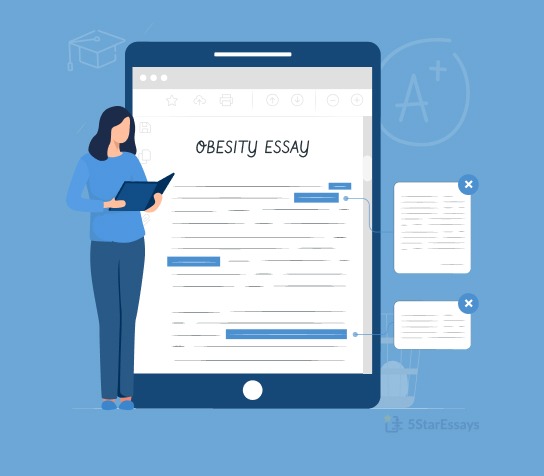
- Thematic Statement Writing Steps with 10+ Examples

- Expert Guide on How to Write a Summary

- How to Write an Opinion Essay - Structure, Topics & Examples

- How to Write a Synopsis - Easy Steps and Format Guide

- Learn How To Write An Editorial By Experts

- How to Get Better at Math - Easy Tips and Tricks

- How to Write a Movie Review - Steps and Examples

- Creative Writing - Easy Tips For Beginners

- Types of Plagiarism Every Student Should Know

Say Goodbye to Academic Stress!
With FREE AI report, Turnitin report, bibliography, title page, and a lot more!
LIMITED TIME ONLY
People Also Read
- personal statement prompts
- how to write a conclusion
- improve writing skills for high school students
- informative essay topics
- impromptu speech topics
Burdened With Assignments?

Advertisement
OFFER EXPIRES SOON!
© 2025- All rights reserved

IMAGES
COMMENTS
May 20, 2019 · Here are seven tips to help you craft a personal essay that will connect with readers. 1 Understand what a personal essay is. Ask three different experts what a personal essay is and you’ll likely get three different answers. Are they structured? Must they address a certain type of subject? Here’s a definition we like:
Jul 1, 2024 · Here are eight steps you can follow when writing a personal essay to ensure it engages your reader and encourages them to learn more about you. Make preparations. Get organized. Choose your topic. Consider your tone. Include a lesson or moral. Write the introduction. Write the body. Write the conclusion. 1. Make preparations.
Use a strong hook (a good intriguing anecdote usually does the trick) to draw readers in. Effective personal essay introduction tips include keeping it concise, setting the tone, conveying your voice accurately, and presenting the main theme or purpose of the essay.
Mar 31, 2022 · This course guides beginning and intermediate writers through elements of how to write a personal essay, helping them identify values expressed in their stories and bring readers into the experiences described.
Jun 14, 2023 · In this article, we’ll show you how to write a personal essay from start to finish, with 10 examples and ideas to get you started. We will talk about the basic structure of a personal essay and give you tips on how to tell a good story and connect with your audience.
Sep 11, 2013 · Today’s tips focus on the personal essay. Be thoughtful, but not fretful. As a senior, most of the accomplishments that will make up the bulk of your application – academic performance, test scores, and extracurricular involvement – are said and done.
Whether you’re a seasoned essayist or in high school and writing an essay thesis statement for the first time, following a few simple steps can help you grab your reader’s attention. With practice, you can hammer home your main points, and share a personal experience in an enjoyable way for readers. Learn more about what is a personal essay. 1.
Sep 9, 2021 · A personal essay is a piece of writing that serves to describe an important lesson gathered from a writer’s life experiences. The essay often describes a significant event from a first-person perspective , and can be done in various writing styles , like a formal essay or as creative nonfiction.
Mar 6, 2024 · Knowing how to start a personal essay, cover the topic, and end it victoriously is a must since the paper can offer a lot of benefits, both personal and academic. Below are some of the key reasons why students may need to craft a personal essay: To stand out in a college application.
Sep 28, 2021 · Follow the steps given below to learn how to write an interesting personal essay. 1. Come Up with an Interesting Topic. When choosing a topic to share with your reader, think about things that you like reading about yourself. These are normally the things that you can relate to, such as overcoming a hurdle, losing a loved one, a milestone, etc.